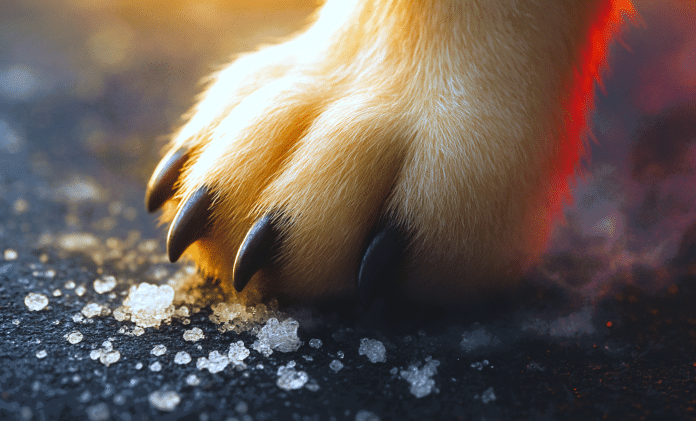St. Louis, MO – As the first winter snow and hard freeze move into Missouri, veterinarians are warning pet owners that cold weather isn’t the only danger this weekend. The road salt and de-icers used to treat streets, bridges, and driveways can burn paw pads, irritate skin, and cause toxic reactions when pets lick or ingest them.
Most ice-melt products used throughout Missouri contain sodium chloride, calcium chloride, or magnesium chloride, compounds that help melt snow and ice but are tough on pets’ paws. Even brief exposure can lead to dryness, cracking, or burns. When dogs lick their feet afterward, they can ingest these chemicals, leading to vomiting, diarrhea, excessive thirst, or lethargy. In more severe cases, veterinarians warn, salt poisoning can result in seizures or kidney failure.
Experts also note that some commercial de-icers contain industrial byproducts or heavy metals, which can increase toxicity risk over time. Because Missouri’s winter weather often alternates between freeze and thaw, pets are exposed to salt more frequently than in states with steady snowpack.
To reduce harm, veterinarians recommend rinsing paws with warm water after every walk and drying them thoroughly. A paw balm or wax can create a protective barrier before heading outdoors, while trimming fur between the toes helps prevent salt buildup. Booties are another option for dogs that tolerate them. Homeowners are encouraged to use chloride-free, pet-safe ice melts around their property.
With overnight lows dropping into the 20s and freezing drizzle expected across much of the state this weekend, veterinarians urge owners to monitor pets closely for limping, paw licking, or hesitation—early signs of salt irritation or chemical burns.
As winter weather returns to Missouri, experts emphasize that the biggest seasonal threat to pets may not come from the snow itself—but from the chemicals spread to fight it.





